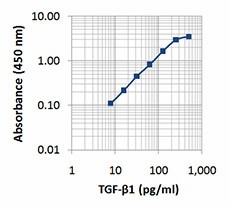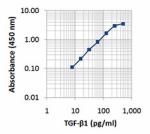- Clone
- 19D8 (See other available formats)
- Regulatory Status
- RUO
- Other Names
- Transforming growth factor-beta 1 (TGF-b1), TGFB1, CED, DPD1
- Isotype
- Mouse IgG1, κ

| Cat # | Size | Price | Quantity Check Availability | ||
|---|---|---|---|---|---|
| 521705 | 50 µg | $112.00 | |||
TGF-β1 is a multifunctional cytokine that plays pivotal roles in diverse biological processes. TGF-β1 is synthesized as a 390 amino acid precursor that is cleaved by furin, localized in the trans-Golgi network, in residue 278. Furin processes the TGF-β1 precursor at the carboxyl side of the consensus sequence RHRR which precedes the NH2-terminal Ala 279 residue of the mature TGF-β1. The TGF-β1 precursor includes the latency-associated peptide (LAP dimer) in the N-terminal portion and the 25 kD portion that constitutes the mature TGF-β1 in the C-terminal. LAP dimer and the TGF-β1 mature protein remain non-covalently associated after furin cleavage and this complex does not bind to the TFG-β1 receptor. In addition, the TGF-β1 latent complex is joined covalently through LAP to LTBP. The TGF-β1 active form requires dissociation from LAP. Some activators can release TGF-β1 from LAP such as thrombospondin-1, reactive oxygen species, and the integrins avb6 and avb8.
Mouse TGF-β1 converts naïve T cells into regulatory T (Treg) cells that prevent autoimmunity. Although human TGF-β1 is widely used for inducing FOXP3+ in vitro, it might not be an essential factor for human Treg differentiation. Th17 murine can be induced from naïve CD4+ T cells by the combination of TGF-β1 and IL-6 or IL-21. Nevertheless, the regulation of human Th17 differentiation is distinct. TGF-β1 seems to have dual effects on human Th17 differentiation in a dose-dependent manner. While TGF-β1 is required for the expression of RORgt, in human naïve CD4+ T cells from cord blood, TGF-β1 can inhibit the function of RORgt at high doses. By using serum-free medium, it has been clarified that the optimum conditions for human Th17 differentiation are TGF-β1, IL-1b, and IL-2 in combination with IL-6, IL-21, or IL-23.
Product Details
- Verified Reactivity
- Human, Mouse
- Antibody Type
- Monoclonal
- Host Species
- Mouse
- Immunogen
- Human TGF-β1
- Formulation
- Phosphate-buffered solution, pH 7.2, containing 0.09% sodium azide.
- Preparation
- The antibody was purified by affinity chromatography, and conjugated with biotin under optimal conditions.
- Concentration
- 0.5 mg/ml
- Storage & Handling
- The antibody solution should be stored undiluted between 2°C and 8°C. Do not freeze.
- Application
-
ELISA Detection - Quality tested
- Recommended Usage
-
Each lot of this antibody is quality control tested by ELISA assay. A concentration of 0.0625 µg/ml of the detection antibody was utilized to generate the example standard curve. It is recommended that the end-user titrate each lot of reagents for optimal performance.
- Application Notes
-
ELISA Detection: To measure TGF-β1, this antibody can be used as a detection antibody in sandwich ELISA format, and paired with the purified 21C11 antibody (Cat. No. 525301) as the capture antibody. Recombinant Human TGF-β1 (ELISA Std.) (Cat. No. 580709) can be used as the protein standard.
Blocking: Clone 19D8 LEAF™ purified antibody (Endotoxin <0.1 EU/μg, Azide-Free, 0.2 μm filtered) is useful for in vitro blocking of human and mouse TGF-β1 bioactivity. The 19D8 clone does not inhibit the bioactivity of human TGF-β2 or TGF-β3 in the Mv1Lu-(caga)12-Luc reporter cell assay.
Note: For testing TGF-β1 in serum, plasma or supernatant, BioLegend's ELISA LEGEND MAX™ Kits (Cat. No. 436708 & 437708) are specially developed and recommended. - Product Citations
-
- RRID
-
AB_2562973 (BioLegend Cat. No. 521705)
Antigen Details
- Structure
- Homodimer
- Distribution
-
TGF-β1 is secreted by numerous cells.
- Function
- TGF-β1 influences the fate of T cells into different subpopulations depending on the occurrence of other cytokines. TGF-β1 induces cell growth and survival, cell and tissue differentiation, development, inflammation, immunity, hematopoiesis, tissue remodeling, wound healing, and stimulates ECM deposition and angiogenesis. It is an essential mediator of pathologic scarring in fibrotic disorders.
- Interaction
- Multiple cells express the TGF-β1 receptors.
- Ligand/Receptor
- Heterodimeric receptor consisting of type I (TbRI) and type II (TbRII).
- Biology Area
- Apoptosis/Tumor Suppressors/Cell Death, Cell Biology, Cell Cycle/DNA Replication, Immunology, Neuroinflammation, Neuroscience
- Molecular Family
- Cytokines/Chemokines, Growth Factors
- Antigen References
-
1. Dubois CM, et al. 1995. J. Biol. Chem. 270:10618.
2. Dennler S, et al. 1998. EMBO J. 17:3091.
3. Annes JP, et al. 2003. J. Cell. Sci. 116:217.
4. Zou Z and Sun PD. 2004. Protein Expr. Purif. 37:265.
5. Park SH, 2005. J. Biochem. Mol. Biol. 38:9.
6. Valcourt U, et al. 2005. Mol. Biol. Cell. 16:1987.
7. Mucida D, et al. 2007. Science 317:256.
8. Acosta-Rodriguez EV, et al. 2007. Nat. Immunol. 8:942.
9. Puthawala K, et al. 2008. Am. J. Respir. Crit. Care Med. 177:82.
10. Takatori H, et al. 2008. Mod. Rheumatol. 18:533.
11. Manel N, et al. 2008. Nat. Immunol. 9:641.
12. Veldhoen M, et al. 2008. Nat. Immunol. 9:1341.
13. Oida T, et al. 2011. PLoS ONE 6:e18365. - Gene ID
- 7040 View all products for this Gene ID 21803 View all products for this Gene ID
- UniProt
- View information about TGF-beta1 on UniProt.org
Other Formats
View All TGF-β1 Reagents Request Custom Conjugation| Description | Clone | Applications |
|---|---|---|
| Biotin anti-human/mouse TGF-β1 | 19D8 | ELISA Detection |
| Ultra-LEAF™ Purified anti-human/mouse TGF-β1 | 19D8 | Block |
Compare Data Across All Formats
This data display is provided for general comparisons between formats.
Your actual data may vary due to variations in samples, target cells, instruments and their settings, staining conditions, and other factors.
If you need assistance with selecting the best format contact our expert technical support team.
-
Biotin anti-human/mouse TGF-β1

-
Ultra-LEAF™ Purified anti-human/mouse TGF-β1

Recombinant human TGF-β1 (black circles, Cat. No. 781802) in...

